Who’s In The Way
Obstacle 1:
Industrial Agriculture/ Agribusiness
The industrial food chain has a massive influence on land use and water consumption for growing, processing and transporting the goods. The meat processing industry is one of the largest consumers of total freshwater. The industrial agriculture sector uses 75% of the world’s agricultural land but it actually produces only about 30% of the world's food. About 50% of the produce is allocated to feed the livestock of which only 12% comes back as animal products.
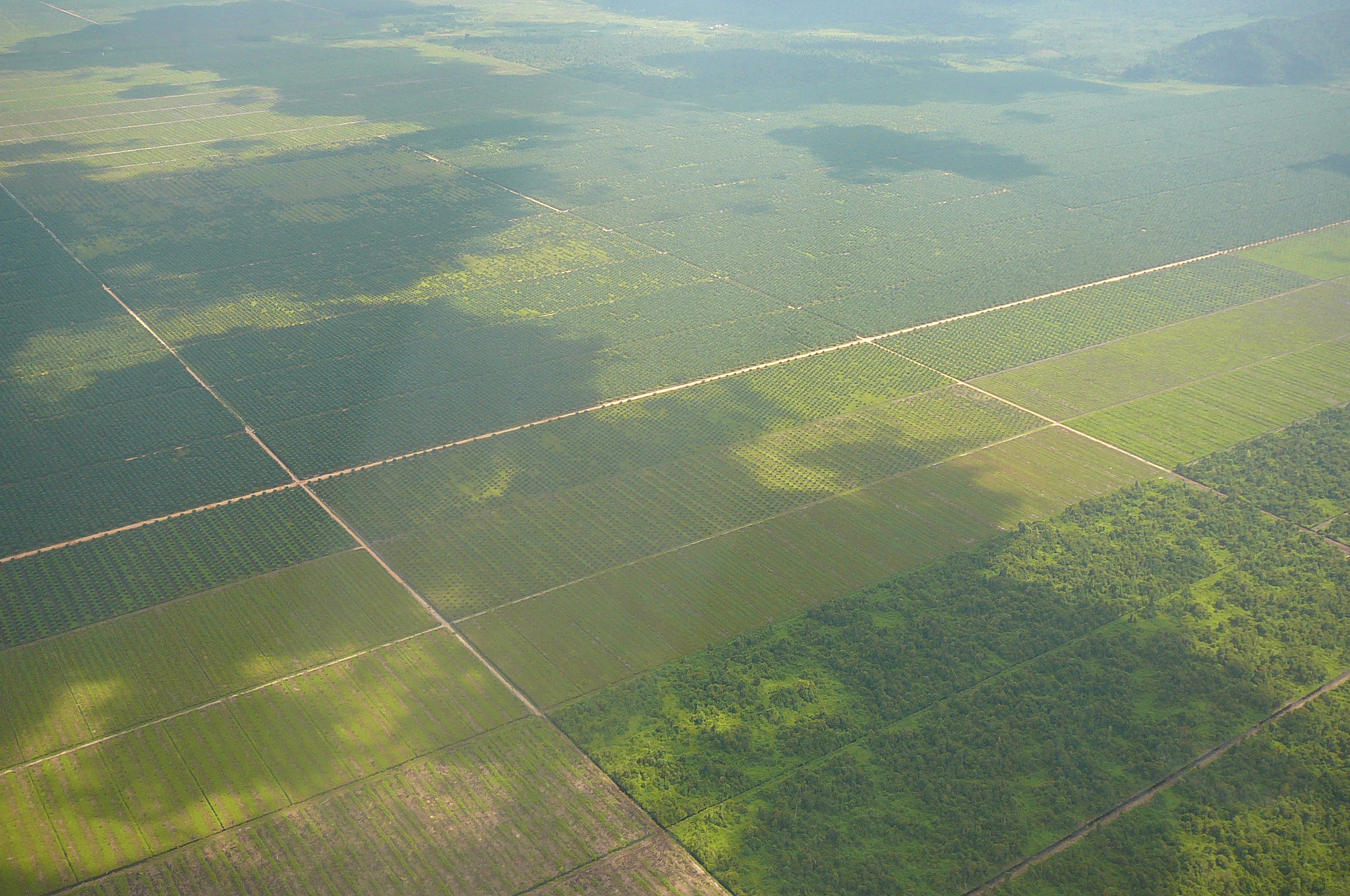
"RAN’s Rainforest Agribusiness Team Investigates Palm Oil Controversy in Indonesia" by Rainforest Action Network is licensed under CC BY-NC 2.0
The increasing demand of meat products puts pressure on agricultural lands as more feed crops results in expansion of land use. Most of the human appropriation of freshwater resources is for agriculture (>80%) and not for drinking (<10%). In order to meet the increasing demands, value chain agriculture framework is promoted as a way to meet demands for feed crops. This further puts pressure on intensifying agri-inputs like seeds, fertilizers, agrochemicals and mechanization to cover the cost and demand, while deteriorating groundwater quality and polluting surface water as pesticides and livestock industry manure runoff results in unhealthy levels of bacteria, phosphorus pollution and frequent algae blooms.
On the other hand, the pollution of water creates dead zones limiting the production of fish stocks for the river communities. More than half a billion people depend on fisheries for their livelihoods of which about 90% fisher people work in the small-scale fishing sector and catch half of the world's total catches by volume. However, Rights-Based Fishing have led to the privatization of the oceans along with a shift from state ownership toward private ownership of fishing rights. The fishing industry implements systems where the 10% minority fisher folks are instructed to catch one particular species. The shift dramatically removes stewardship which was built on the multi-species character of small-scale fisheries. The marginalised fishers whose livelihoods depend on marine resources eventually lose their livelihoods due to the privatization efforts. It is critical to recognize small-scale fisher communities in order to transition towards an ecologically and socially just food regime.
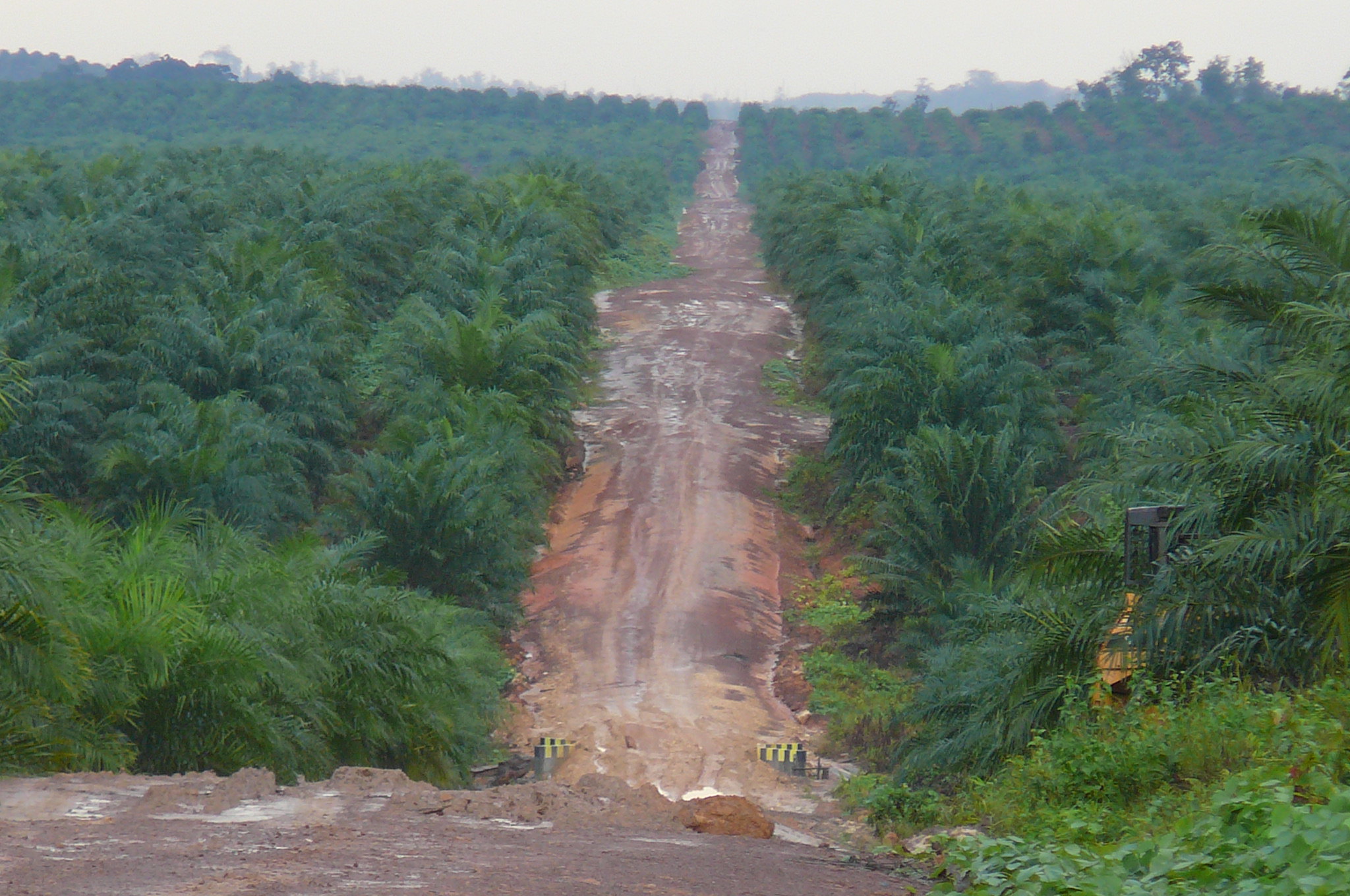
"RAN’s Rainforest Agribusiness Team Investigates Palm Oil Controversy in Indonesia" by Rainforest Action Network is licensed under CC BY-NC 2.0
Therefore, in order to move away from exploitation of land, water and labor, it is critical to recognize and promote food soverignity as a way forward. Food Sovereignty is a solution to address the global water crisis because of the amount of water used in the global food supply chain.
This solution intersects with solutions for food and can be found here.
Organizations working against Industrial Agriculture or Agribusiness:
ETC Group
ETC Group works to address the socioeconomic and ecological issues surrounding new technologies that could have an impact on the world’s poorest and most vulnerable people.- The Industrial Food Chain Vs. The Peasant Food Chain
- Farmers' Rights & Food Sovereignty
- Video: Who Will Feed Us? The Peasant Food Web vs the Industrial Food Chain
- The Next Agribusiness Takeover: Multilateral Food Agencies
- Three Big Battles for Global Food Policy Looming
Global Alliance for the Rights of Nature (GRAIN)
GRAIN is a small international organization which supports the struggle of peasants and social movements to strengthen the control of communities over food systems based on biodiversity. Their report Impossible Emissions shows that together, the top five meat and dairy companies (JBS, Tyson, Cargill, Dairy Farmers of America and Fonterra) are already responsible for more greenhouse gas emissions than ExxonMobil, Shell or BP.- [Report] Impossible Emissions: How Big Meat And Dairy Companies Are Warming The World
- [Article] Animal Agriculture and Dairy Industries
- [Video] Animal Agriculture; Factory Farming & Climate change
- [Quarterly Magazine] Seedling
- [Report] 2019 Activity Report
Transnational Institute’s Agrarian & Environmental Justice programme
TNI’s Agrarian & Environmental Justice programme brings together research and analysis on the collective struggles of rural working people to democratise access, ownership, and control of land, water and other natural resources. It works closely in alliance with local, national and global alliances of small-scale farmers, fisherfolk and marginalised rural working people.- [Resource page] Transformative practices
- [Report] Your Land, My Land, Our Land: Grassroots strategies to preserve farmland and access to land for peasant farming and agroecology
- [Report] Growing power: Mega-Mergers and the fight for our food system
La Via Campesina
La Via Campesina is an international movement bringing together millions of peasants, small and medium size farmers, landless people, rural women and youth, indigenous people, migrants and agricultural workers from around the world. Built on a strong sense of unity, solidarity between these groups, it defends peasant agriculture for food sovereignty as a way to promote social justice and dignity and strongly opposes corporate driven agriculture that destroys social relations and nature.Friends of the Earth International (FOEI)
FOEI campaign’s on today’s most urgent environmental and social issues. We challenge the current model of economic and corporate globalization, and promote solutions that will help to create environmentally sustainable and socially just societies.Additional Resources on Food’s Impact on Water
- Irrigation for farming depleting groundwater resources
- Meat’s large water footprint
- Water pollution from U.S. meat processing plants
- Poor water quality on Virginia’s Eastern Shore from Poultry and Manure Production
- Water Pollution from Livestock in the Shenandoah Valley
"Fishermen in the river, Solimoet, in the Amazon river basin" by World Bank Photo Collection is licensed under CC BY-NC-ND 2.0
Organizations leading the fight against Fishing Industries
World Forum of Fisher Peoples’ (WFFP)
The World Forum of Fisher Peoples (WFFP) is a mass-based social movement of small-scale fisher people from across the world, founded on 21 November 1997 in New Delhi, India, by a number of mass-based organisations from the Global South. WFFP has 29 member organisations from 23 countries and represents over 10 million fisher people from all over the world.World Forum of Fish Harvesters & Fish Workers (WFF)
WFF is an international organization that brings together small scale fisher organization for the establishment and upholding of fundamental human rights,social justice and culture of artisanal /small scale fish harvesters and fish workers,affirming the sea as source of all life and committing themselves to sustain fisheries and aquatic resources for the present and future generations to protect their livelihoods.- No To Blue Carbon, Yes To Food Sovereignty & Climate Justice
- Workshop: Implementation of the Voluntary Guidelines for Securing Sustainable Small Scale Fisheries (SSF Guidelines)
- A Call for Governments to Stop Supporting the Global Partnership for Oceans (GPO) and Rights-Based Fishing (RBF) Reforms
Additional Resources:
Books, Articles, and Reports:
- Food Justice: An Environmental Justice Critique of the Global Food System
- (IPES) Breaking away from industrial food and farming systems: Seven case studies of agroecological transition
- Environmental Justice and Sustainable Agriculture
- Pesticides: Health Effects in Drinking Water
- Pesticides as Water Pollutants
- The Global Ocean Grab: A Primer
- Ocean grabbing: a new wave of enclosures
Maps and Catalogs:
- EJAtlas - Mapping environmental conflicts (Pick water management under category to review water management conflicts)
Documentaries and Videos:
Obstacle 2:
Extractive Industries
The central mechanisms of extractive industries capitalize on the environment through commodification or more commonly through the establishment of ecosystem services. Some of the most extensively operated extractive industries that impact people and our environment throughout the developmental stages are oil & gas, hydroelectric power dams, dams and reservoirs (agricultural purposes and consumption), beverage companies, mining, retail industries (fashion, manufacturing goods, plastics), and industrial agriculture projects (groundwater extraction). The process of minerals extraction creates industrial wastelands from vast open pit mines and mountaintop removal, voracious use and poisoning of water systems, deforestation, contamination of precious topsoil, air pollution, acid leaching, and cancer clusters. The construction of large scale projects like dams and reservoirs divert a major part of river flows, threatening the livelihood and survival of rural communities and indigenous peoples who depend on the rivers, leading to loss of biodiversity affecting fishing communities and again leading to food insecurity.
 Roy, Arundhati, and Aradhana Seth. Dam/age: A Film with Arundhati Roy. Brooklyn, NY: First Run/Icarus Films, 2004. Internet resource.
Roy, Arundhati, and Aradhana Seth. Dam/age: A Film with Arundhati Roy. Brooklyn, NY: First Run/Icarus Films, 2004. Internet resource.In the last 50 years, the transport of goods through globalization has also given rise to the concept of ‘virtual water’. Virtual water is defined as the hidden flow of water if food or other commodities are traded from one place to another. Large private water companies, agribusinesses and extractive industries are the main profitters and traders of virtual water (the amount of water embedded within the production, processing and trade of commodities). The extraction of water for the production and processing of products for global consumption has altered the dynamics of how we interact with our environment.
The push to create stronger regulations from the impacts of Climate change has led to the dramatic shift in domestic environmental laws and the introduction of state agencies to oversee the facilitation and implementation of the federal and local laws. The efforts to mobilize should not be limited to enforcements because fundamentally the state is designed to act as a platform to legally extract through state mechanisms like permits, enforcements and licenses to operate. The state’s central function is to legally allow extraction of resources for the sole purpose of profit margins and economic developments. In the late 1960s, nations in the global North saw a rise of the modern environmental movements which extended to influence the global south and follow a similar pattern introducing regulations, enforcements and impact assessment reports. However, it is important to be critical of the platform which is premised to operate within the system that is designed to exploit the environment for the sole purpose of development through management and ecosystem services.
Organizations leading fight against Extractive Industries
The GAIA Foundation
The GAIA Foundation is an organisation with over 30 years experience accompanying partners, communities and movements in Africa, South America, Asia and Europe. Together we work to revive bio-cultural diversity, to regenerate healthy ecosystems and to strengthen community self-governance for climate change resilience. Post-extractivism is founded in philosophies of Buen Vivir (Good Living) and intersects with alternative development and economic theories/practices from de-growth to the commons.- [Report] Opening Pandora’s Box – A New Wave of Land Grabbing for the Extractive Industries and The Devastating Impact on Earth
- [Post-extractivism Library] Post-extractivism: Emblematic Cases From Finland To Colombia
- [Guidebook] Protecting Your Community From Mining And Other Extractive Industries
- [Web resources] Learning: Exploring Post-extractivism
- [Documentary] In Defence of Life
- [Report] Beyond Development: Alternative Visions from Latin America
Yes To Life, No To Mining (YLNM)
YLNM was founded in 2014 by communities, organisations and networks from Africa, Europe, North and South America. The network exists to support those communities who have decided to say NO to mining, in recognition of their right to say no, their right to Free Prior and Informed Consent and the unique challenges they face in defending land, water and life.The organizations are also listed under Obstacles section in Energy + Minerals Section [Link here]
Readings & Resources to learn more about issues related to Extraction
- Fossil Fuel (Coal, Oil, Gas)
- [Interactive Mapping tool] Global Coal Power
- [Blogpost] Oil Spill in Sundarban, Bangladesh
- [Video] True Cost of Chevron Network and the Protect the Protest Coalition
- [Report] US groundwater polluted by Coal’s Poisonous Legacy
- [Report] Groundwater Contamination from Texas Coal Ash Dumps
- [Website] Dakota Access Pipeline, North Dakota
- [Article] Timeline of Dakota Access Pipeline
- [Paper] Beyond Development: Extractivism and neoextractivism
- Beverage Companies
- (Article/Video) Land, Labor and Water Extraction
- (Article) Water grabbing by Nestle in Ontario, Canada
- (Article) Water Extraction by Nestle in Florida Springs
- (Article) Water Extraction by Coca-Cola plant in India
- (Article) Nestlé Just Took Its 2 Billionth Litre
- [Fact Sheet] Protect Water: Boycott Nestlé
- (Article) China’s Bottled Water Industry
- (Article) Bottled Water from Tibetan Plateau
- Mining
- Undermining The Water Cycle – Extractive Industries & A Planetary Water Crisis
- [Article] Sand mining prompting floods in Kerala, India
- [Article] Riverbed mining in Yamuna River,India
- [Article] Rivers, People, Revenue Robbed in Uttarakhand, India
- [Paper] Mining for Mother Earth. Governmentalities, sacred waters and nature's rights in Ecuador
- [Academic Project] Extractive industries, mining and water rights
- [Publications] Miningwatch - Canada
- Hydro Dams
- [Video] Problems with Big dams
- [Overview] The case against large Dams
- [Video] Is Hydropower benign, reliable and financially viable?
- [Blog post] On Extraction and Dams in Tibet
- [Video] Belo Monte Dam on the Lower Xingu
- [Video] Dam Is Destroying Rainforest And Displacing Thousands In Brazil
- [Article] Water supply solution? Dams in Pakistan
- [Blogpost] Displacement from Tehri dam, India
- [Article] The Cost of Living by Arundhati Roy on damming Narmada River
- [Newsletter] Impact of Dams in Mekong River
- [Report] Dams, Rivers and People; Coping with Floods in a Changing Climate
- Retail Industries [Manufacturing industries]
- Groundwater Extraction
- [Analysis Report] Critical issues on Groundwater in India
Obstacle 3:
Financial Institutions, Transnational corporations and Governance
Understanding and responding to water injustice will necessarily involve attention to key linkages related to food, energy, and health and other sectors. Water access and the quality of water are highly unequal as it varies according to a range of social and spatial gradients.
Water grabbing involves the capturing of the decision-making power around water, including the power to decide how and for what purposes water resources are used now and in the future. The injustice deprives local communities whose livelihoods often depend on these resources and ecosystems.The dominating forms of water expertocracy facilitating privatization and water grabbing have varying levels of detrimental impacts on the environment and local communities. Subsequently, it is critical to recognize the comprehensive mechanisms that underpin large scale projects across the globe. They are initially supported by transnational corporations and/or financial institutions, and facilitated by treaties, international policies, backed by credit agencies, and formulated and/or operated government bodies. At the local level, the projects are consulted with water experts, reviewed and approved by local state agencies whose primary goal is to secure and strengthen economic development, while ignoring the detrimental effects of the projects on the local communities.
The environmental crises of the Anthropocene are deeply connected to economic policies that have enabled and continues to perpetuate exploitation and injustices. Some of the major global institutions and sectors are listed below:
- Public-Private Partnerships (PPP)
- State bureaucracies and Water Expert Communities
- Water Privatization Companies
- Transatlantic Trade and Investment Partnership (TTIP)
- World Trade Organization (WTO)
- World Bank
- International Finance Group (IFC)
- Asian Development Bank (ADB)
- International Monetary Fund (IMF)
- Trans-Pacific Partnership (TPP)
Organizations working to create awareness about Trade agreements:
Bilaterals.org
A shared concern about the growth of bilateral trade and investment deals outside of the World Trade Organisation (WTO) and a feeling that these less visible agreements were "under the radar" of many social justice activists led to the formation of bilaterals.org website. The site’s goal is really to support social movements resisting the imposition of these deals, in a way that builds bridges between isolated efforts and shows the bigger, often global, dynamics at play.- [Website Resource] Updates on Corporate Interests
- [Website Resource] Updates on Investments
- [Article] What’s wrong with free trade agreements
- [Platform] Stop Investor-state Dispute Settlement (ISDS)
La Via Campesina
La Via Campesina is an autonomous, pluralist, multicultural movement, political in its demand for social justice while being independent from any political party, economic or other type of affiliation. The movement fights against Capitalism and Free trade, Transnational Companies and Agribusiness, and Patriarchy. - Capitalism and Free Trade
- [Article] It’s time to transform. It’s time to Globalize Solidarity, Localize Agriculture!
- Transnational Companies and Agribusiness
- [Key Documents] Free Trade Agreements
- [Video] India-US Free Trade Agreement and its impact on small-scale food producers in India
- [Video] 5 Reasons Why WTO Is Bad For Agriculture | Explainer
Transnational Institute(TNI)
TNI’s Trade & Investment project opposes the European Union’s corporate-driven trade and investment policies by providing well-researched analysis on its social and ecological impacts, supporting the development of popular campaigns and proposing alternative policies that prioritise people’s rights over corporate profits.- [Policy Brief] Silent expansion: Will the world’s most dangerous investment treaty take the global south hostage?
- [Report] Impacts of investment arbitration against African states
- [Publication] The Belt and Road Initiative (BRI): An Asia Europe People’s Forum (AEPF) Framing Paper
- [Report] Regional Comprehensive Economic Partnership (RCEP): Trade talks fail the transparency and public participation test
-
[Report] TiSA and the Threat to Public Banks: Why we must stop this global financial Inferno
- [Report] International regulatory cooperation and the public good
Overview of Trade Agreements & Info on Global Financial Structures
- Economic model of development (capitalism and colonialism)
- Ecological Debt (North-South Divide)
- World Bank’s International Centre for Settlement for Investment Disputes (ICSID): As a form of Investor protection mechanism, Investor-state dispute settlement (ISDS) is included in bilateral investment treaties and used by water multinationals to claim exorbitant amounts of public money in compensation for canceled service management contracts. It gives foreign investors the ability to directly sue countries in private international tribunals for compensation that allegedly undermine their corporate rights.
- Trade in Services Agreement (TiSA) makes the liberalization and privatization of water irreversible. TiSA participants account for about 70% of world trade in services and include the European Union, in addition to the United States and Australia.
- Memorandum of Understanding (MoU) is an agreement between two or more parties outlined in a formal document.
- Environmental Impact Assessments (EIA) are reports produced by stakeholders of a project that sets criterias to allow or deny the physical infrastructure systems built around the world. Some of the main components include: legal basis, coverage, consideration of alternatives, screening and scoping, EIA report preparation, EIA report review, decision making, impact monitoring, mitigation, consultation and participation, system monitoring, costs and benefits, and strategic environmental assessment (SEA)
- [Reflections] Dams in Teesta River in Sikkim, India
- [Overview] Shortcomings of review structure and process (Teesta River, India)
- Ministry of Environmental Forestry [MoEF] (Forest Clearances, India)
- North American Free Trade Agreement (NAFTA): NAFTA is one of the biggest threats as it protects the right of foreign investors. Water is defined as an investment as it becomes a tradable good under NAFTA allowing vast and unsustainable amounts of water to extract oil from the tar sands, to bottle ancient glacier water and groundwater, and to dump their waste into lakes.
Additional Reports, Publications & Articles:
- [Paper] The Social Construction of Scarcity, Water in Western India
- [Article] Perils of the US-India free trade agreement for Indian farmers
- [Report] The Clean Development Mechanism: Local Impacts of a Global System
- [Blogpost] Anti-politics of climate change [Bangladesh]
- [Slides] Water governance in India
- [Paper] The UN World Water Development Report 2016, Water and Jobs : A Critical Review: Assessment: WWDR 2016, Water and Jobs
- (Article) Indian Tea Estates [Land and water grab]
- (Report) Indian Tea Plantations
- [Leaflet] The Unfair Cooperation Agreement on Water Privatization (Jakarta)
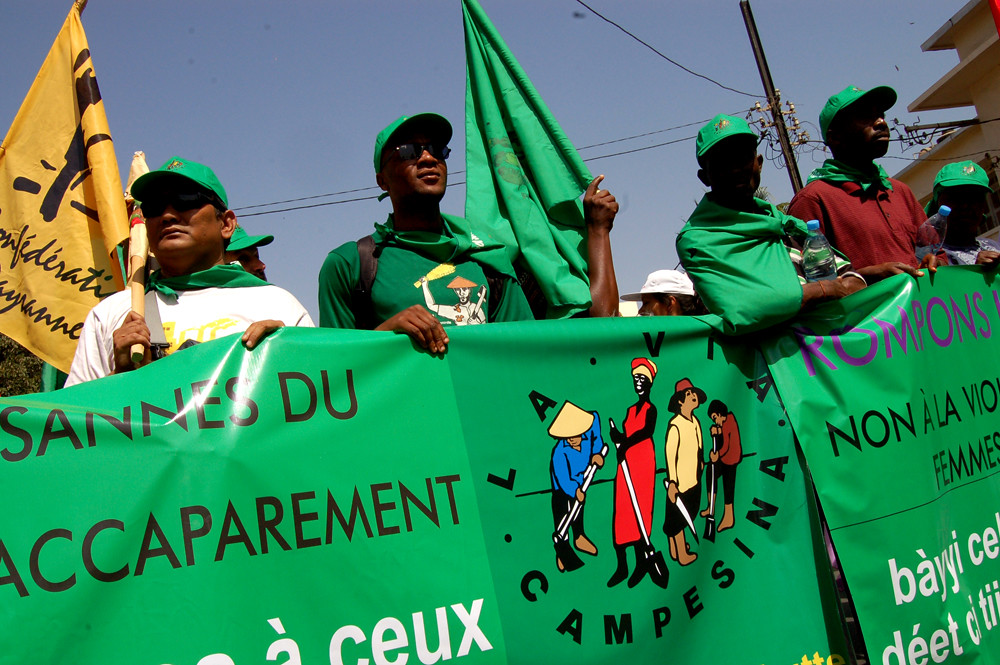
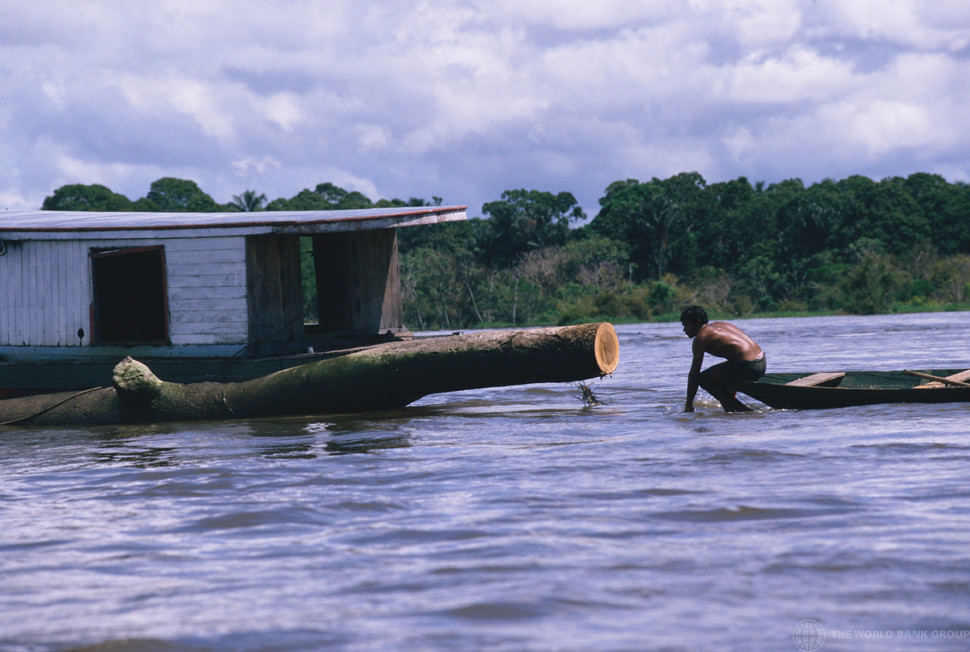
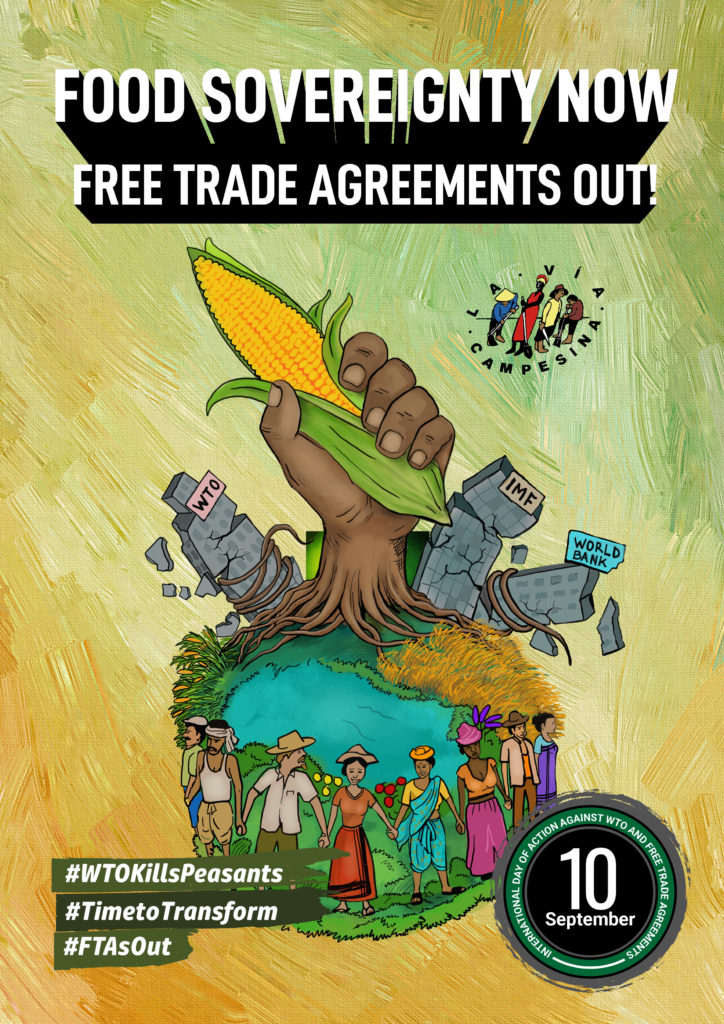 Poster Image from La Via Campesina’s
Poster Image from La Via Campesina’s